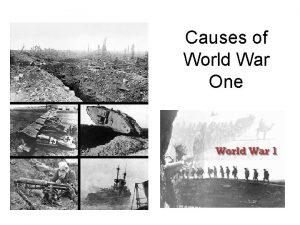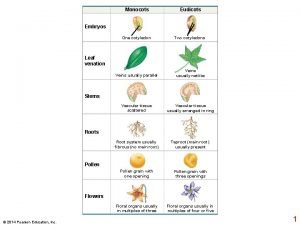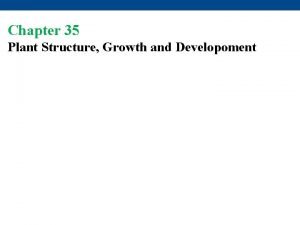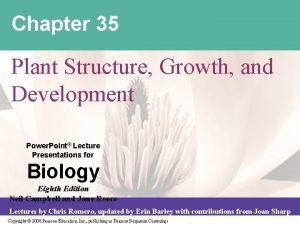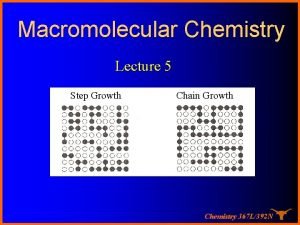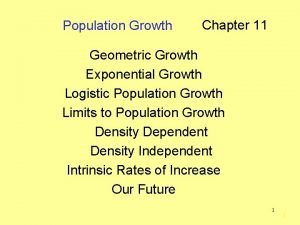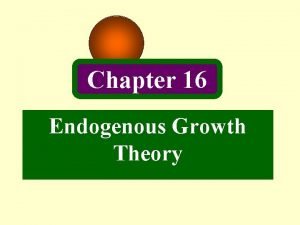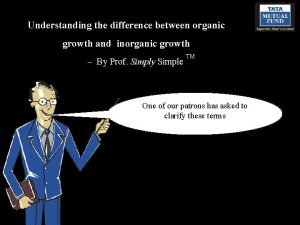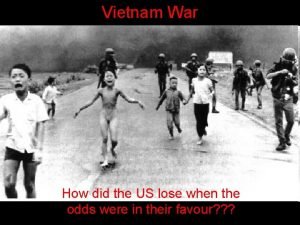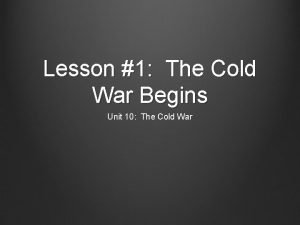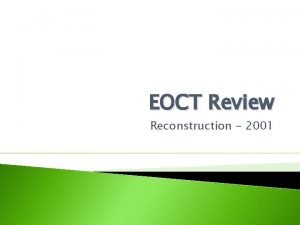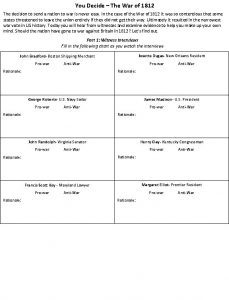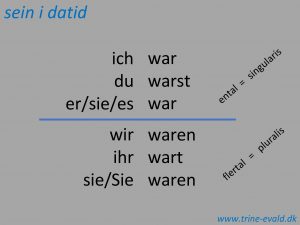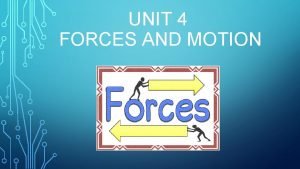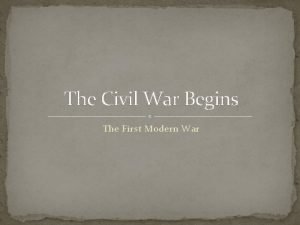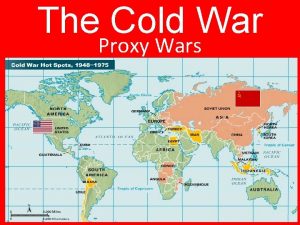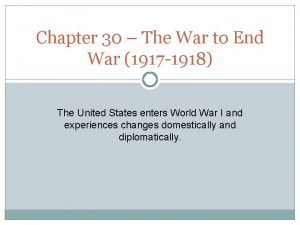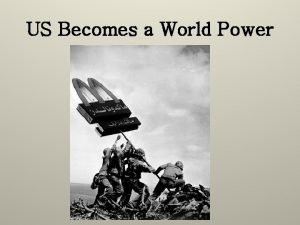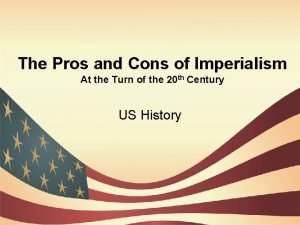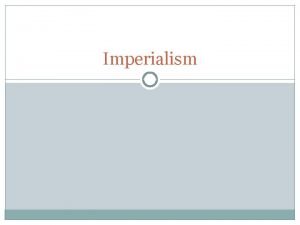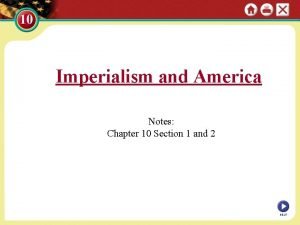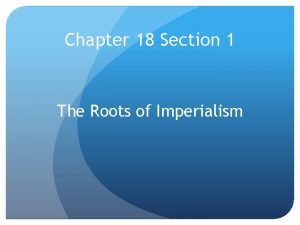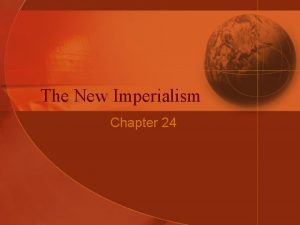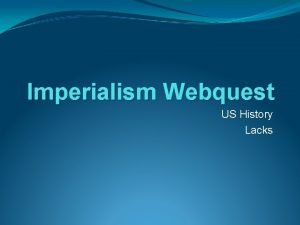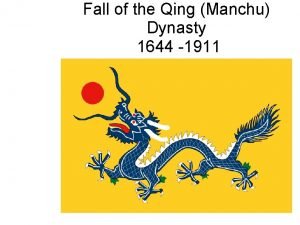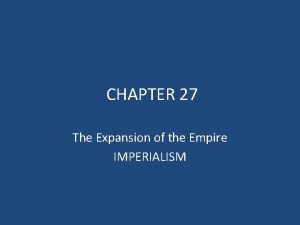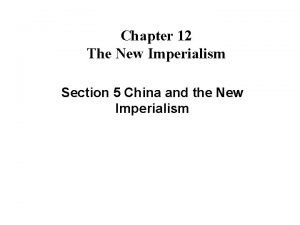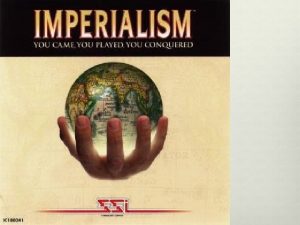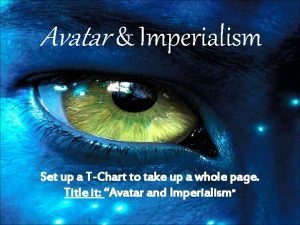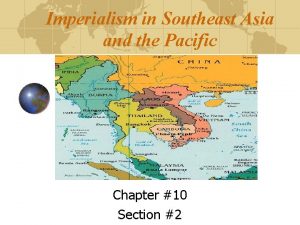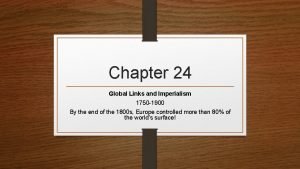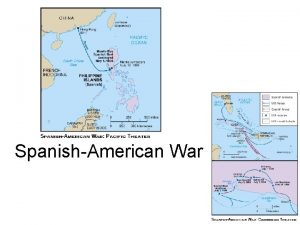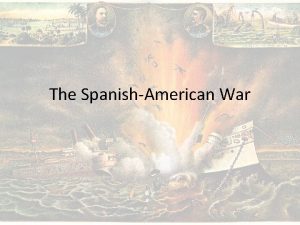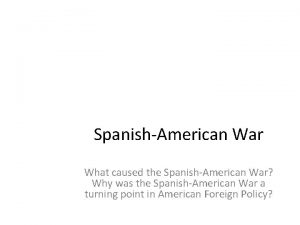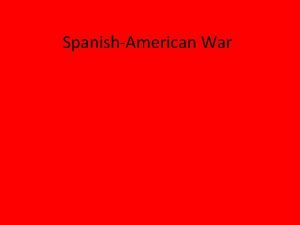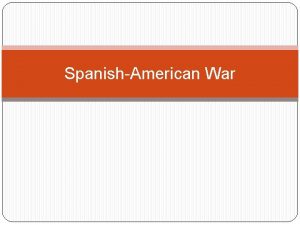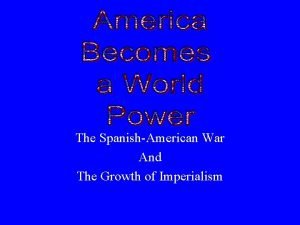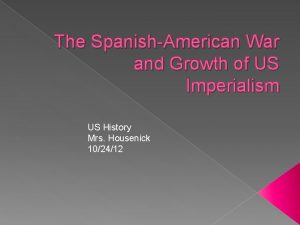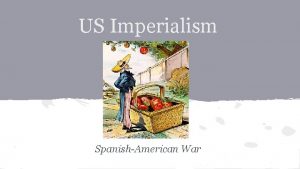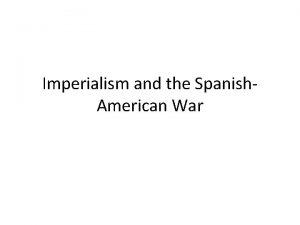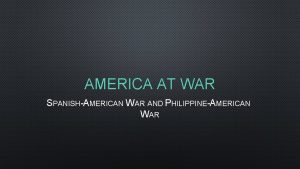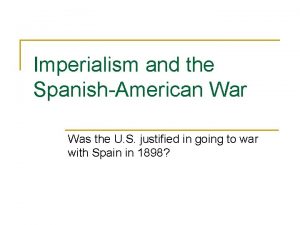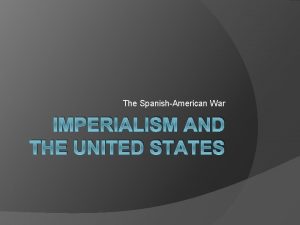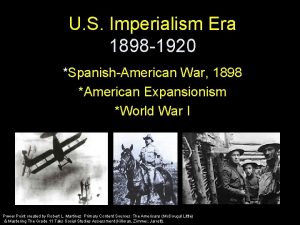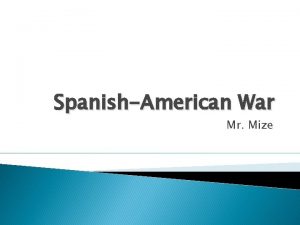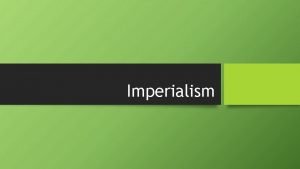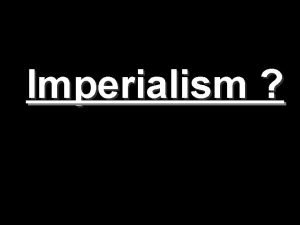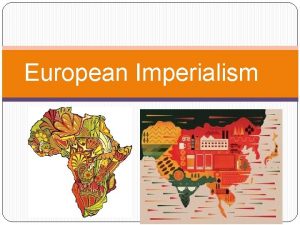The SpanishAmerican War and The Growth of Imperialism






































- Slides: 38

The Spanish-American War and The Growth of Imperialism


U. S. Expansionism in the 1800 s w Manifest Destiny – The notion that Americans were a superior people and had the right to control the North American Continent. Civil War Interrupted expansionist march Once over Americans looked for new frontiers to conquer. By 1890 the conquering and settling the continental U. S. was complete.


w The Turn to Expansionism – Economic expansion – Communication and travel improved – Industrialization created surpluses – Development of foreign trade From Expansionism to Imperialism New economic markets spurred on U. S. expansionism. Notion of an American empire Foreign trade would reap profits for U. S. Captain Alfred t. Mahan’s book the “New Navy” furthered the expansionist appeal, supported imperialism, and propelled the modernization of the U. S. Navy.

Reverend Josiah Strong

w U. S. economic and political expansion – Manifest destiny took on a new international focus. – Increase American glory and prestige throughout the world. – Moral obligation to spread democratic and Christian values to people in other lands. “Our Country” by Reverend Josiah Strong Americans were special Representatives of “the purest Christianity” and the highest civilization. “lift up” peoples from “uncivilized” non. European societies.

w The Debate over Imperialism – Became a great discussion among Americans – Politically it was necessary for U. S. prosperity to control new territories. – Anti-imperialist did not believe trade should lead to domination of one nation over another. – Building overseas American empire might weaken institutions at home, invite war, or violate self-determination principles. – the right of a people to choose a government without interference. Growing involvement by the U. S. in Latin America and in the Pacific Islands.


Revolution in Cuba w Trouble Brewing in Cuba 1. involvement in Cuba brought the U. S. into a potential conflict with Spain. 2. Cubans struggle for independence from Spain. U. S. Interest in Cuba 1. U. S. identified with Cubans fight for independence. 2. A natural extension of U. S. territory 3. Sugar plantations attracted economists.

Jose Marti, Cuban expatriate gathered arms, money, and men in New York to fight Spanish rule. The Revolution Begins Marti launched a revolution from the U. S. A fierce and destructive war with Spain was the result. Troops under the command of Valeriano “Butcher” Weyler forced hundreds of thousands of Cubans in “reconcentration” towns and camps.

w Americans Keep Watch – 1. U. S. investments nearing $50 million – 2. Sensationalized stories of the horrific conditions in reconcentration camps. – 3. Americans began to side with Cubans. Mc. Kinley Wants to Avoid War 1. Americans elect William Mc. Kinley 2. 1898 new government comes to power in Spain. 3. Americans encouraged by proposed a. Reforms in the reconcentration policy b. Promise of some autonomy for Cubans



The Maine Incident The Maine Explosion 1. Spanish troops opposed to reforms rioted in capital city, Havana. 2. Mc. Kinley ordered the battleship Maine to Havana Harbor 3. Feb. 15 the Maine was rocked by an explosion killing 260 American officers and crew.

w The Mystery of the Maine 1. Call for revenge in the press: “Remember the Maine! To War with Spain!” 2. No evidence to prove Spain’s responsibility for the disaster. 3. A naval board investigated. Conclusion: a mine had caused the explosions. 4. Irate Americans blamed Spain. 5. 1976 U. S. Admiral Rickover conducted a study and concluded a faulty boiler, had caused the explosion.



William Randolph Hearst Joseph Pulitzer

“Victory Dance”

Frederic Remington

Yellow Journalism Pushes the United States Toward War w Yellow Journalist Push for Military Action 1. American journalist resorted to “yellow” journalism: sensational headlines and stories, with little attention to facts, designed to grab the attention and stir up the emotions of readers.

w 2. William Randolph Hearst & Joseph Pulitzer were key proponents. 3. They sought to gain new readers and boost their circulation. 4. Hearst sent the talented Frederic Remington to Cuba to draw sketches of atrocities. 5. Remington reported that atrocities were not grave enough to warrant hostilities. 6. Hearst responded, “You furnish the pictures and I’ll furnish the war. 7. Critics of yellow journalists blame U. S. entry to war with Spain.

w Mc. Kinley Calls for War 1. March 1898 Mc. Kinley sent Spain an ultimatum demanding: a. An armistice b. Ending reconcentration c. Appointing himself an arbiter. 2. Spain declared unilateral armistice 3. Unilateral armistice gave Cubans no say and did not guarantee peace. 4. President asked Congress to declare war on April 19, 1898. 5. Five days later Spain responded with its own declaration of war.


“A Splendid Little War” w The Spanish-American War’s first action took place not in Cuba, but in the Philippines. w Last of the Spanish held territories in the Pacific. w The U. S. easily defeated the Spanish in Manila under the Direction of Admiral George Dewey.

San Juan Hill

Fighting in Cuba w Victory in Cuba would not come easily. w U. S. War Department was not prepared for land battles. w Most famous battle in Spanish-American War was the charge up San Juan Hill on July 1, 1898. w Teddy Roosevelt led the Rough Riders in the Charge. w The U. S. navy sank every Spanish ship. w 2, 500 Americans died. w John Hay wrote to T. R. , “A splendid little war” w On July 17, 1898 Spanish troops in Cuba surrender

Treaty of Paris

Treaty of Paris w The U. S. signed the Treaty of Paris with Spain in December 1890 w Spanish government recognized Cuba’s independence. w For a payment of $20 million, Spain gave up the Philippines, Puerto Rico, and Guam to the United States.



The United States Emerges as an Imperialist Power w Continuing U. S. Influence in Cuba – U. S. involvement did not end with the war. – P. Mckinley set up military rule – The U. S. insisted that the Cuban constitution include the Platt Amendment: • Limited Cuba’s foreign policy interaction • Right to naval bases on the island • If necessary to send troops to Cuba to keep order

Emilio Aguinaldo

w The Philippines Become a U. S. Colony – Should the U. S. keep the Philippines as a colony? ? ? – Filipinos were “unfit for self-government. – Best choice was for the U. S. to take the islands and educate, uplift, civilize, and Christianize the Filipinos – Filipinos wanted self-government – Filipino nationalist, Emilio Aguinaldo refused to recognize U. S. rule – Aguinaldo was deported from his company. – 3 -year with U. S.

w The U. S. Emerges a World Power – U. S. empire stretched from the Caribbean Sea to the South China Sea. – By 1899 the U. S. had expanded its control to include, in addition to Puerto Rico, Guam, and the Philippines, Hawaii (1898) and many other Pacific islands, including Samoa (1899).

Anti-Imperialists

w Anti-Imperialism – Many Americans were unhappy and angry with this status of new world power. – Anti-imperialists included both Democrats and Republicans. – Driven by moral and humanitarian sentiments. – They rejected the exploitation of indigenous peoples and claimed that the U. S. was not doing that which it had bought a war with Spain to end.
 Old vs new imperialism
Old vs new imperialism Motives of old imperialism
Motives of old imperialism Crisis de bosnia 1908
Crisis de bosnia 1908 Growth analysis definition
Growth analysis definition Monocots eudicots
Monocots eudicots Primary growth and secondary growth in plants
Primary growth and secondary growth in plants Vascular ray
Vascular ray Step growth polymerization vs chain growth
Step growth polymerization vs chain growth Geometric vs exponential growth
Geometric vs exponential growth Neoclassical growth theory vs. endogenous growth theory
Neoclassical growth theory vs. endogenous growth theory Difference between organic and inorganic growth
Difference between organic and inorganic growth Toward civil war lesson 3 secession and war
Toward civil war lesson 3 secession and war What challenges did madison face abroad
What challenges did madison face abroad Vietnam war
Vietnam war Lesson 1 the origins of the cold war
Lesson 1 the origins of the cold war Comparing reconstruction plans venn diagram
Comparing reconstruction plans venn diagram Why did josette dugas want to go to war
Why did josette dugas want to go to war Sein war
Sein war Studyjams force and motion
Studyjams force and motion Why was the civil war the first modern war
Why was the civil war the first modern war Perfect lizz
Perfect lizz Sides of cold war
Sides of cold war Chapter 30 the war to end war
Chapter 30 the war to end war Chapter 30 the war to end war
Chapter 30 the war to end war Imperialism vs colonialism
Imperialism vs colonialism Cons of imperialism
Cons of imperialism Indirect and direct control imperialism
Indirect and direct control imperialism Imperialism and america chapter 10 section 1
Imperialism and america chapter 10 section 1 Roots of imperialism
Roots of imperialism Chapter 24 section 5 china and the new imperialism
Chapter 24 section 5 china and the new imperialism Imperialism in africa webquest
Imperialism in africa webquest Chinese old hairstyle
Chinese old hairstyle China and imperialism
China and imperialism Chapter 12 section 5 china and the new imperialism
Chapter 12 section 5 china and the new imperialism Imperialism and industrialization
Imperialism and industrialization Avatar and imperialism
Avatar and imperialism Imperialism in southeast asia and the pacific
Imperialism in southeast asia and the pacific Chapter 24 global links and imperialism
Chapter 24 global links and imperialism Chapter 18 building vocabulary america claims an empire
Chapter 18 building vocabulary america claims an empire


